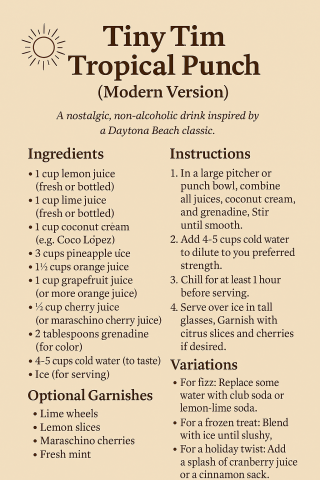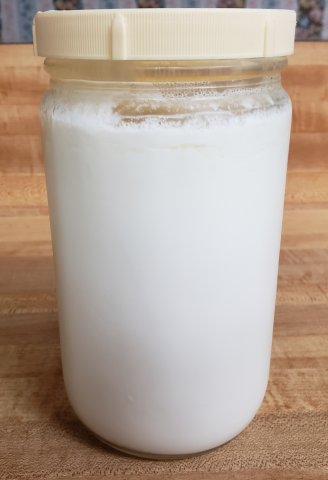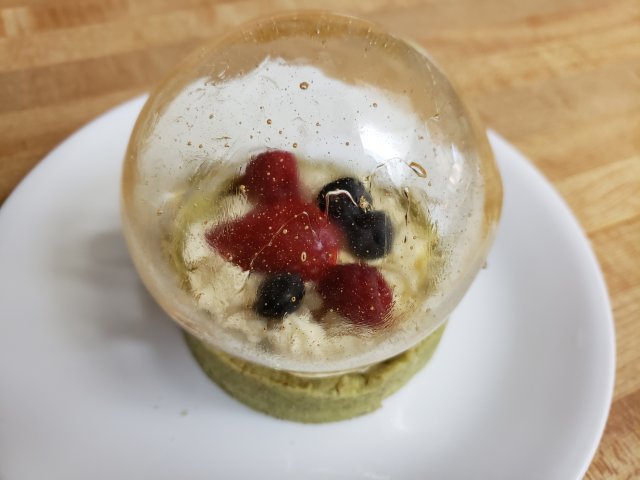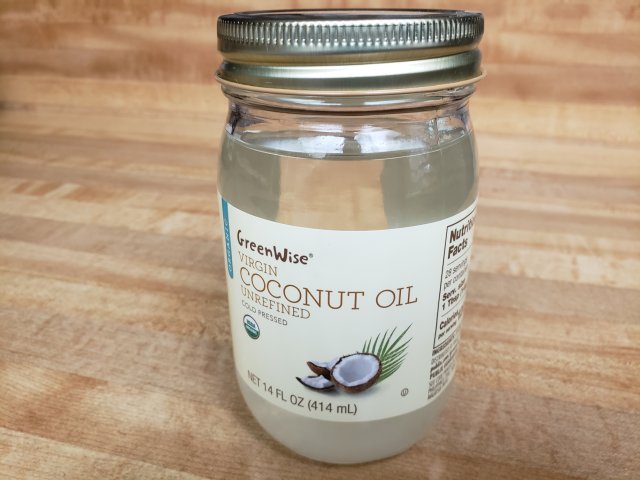For another of the numerous projects that overflow my cup of time, I was perusing my post of almost a decade ago, A Dickens of a Drink, in which I lament the loss of a favorite drink from the old Kay's Coach House restaurant in Daytona Beach. Although the kindly bartender responded to our family's enthusiasm and my youthful pleas by writing out the recipe, I was never able to acquire many of the ingredients. Even today, with Google and the vast resources of the Internet to help, a search for "Bartender's Coconut Mix" brings up only a sponsored handful of coconut liqueurs—and my own post. Cherry juice was not something available in grocery stores back then, and I'd never heard of grenadine.
As I have occasionally been doing recently, as part of my AI Adventures, I asked Copilot to analyze the text of my old post. As part of its response, it asked, "Would you like help modernizing the Tiny Tim recipe for today’s ingredients?" What an idea! Well, nothing ventured, nothing gained, and here's what it came up with (click image to enlarge):
I am looking forward to trying this out on a smaller scale. I'm sure I can find all the ingredients. A quick reflection makes me question some of the proportions, but it's a great place to start. Maybe that's what an AI tool should be all about: Begin with a well-researched base, then add the human element (experiment and taste) to make it real.
Permalink | Read 237 times | Comments (1)
Category Children & Family Issues: [first] [previous] Everyday Life: [first] [previous] Food: [first] [previous] AI Adventures: [first] [previous] [newest]
This is my dream garden. It's not an achievable dream at this point in my life, and even if I were much younger, there's a lot more to creating a system like this than he discusses. It's not so much a garden as a very small farm (albeit this one is in suburban Long Island), and requires farm-level work. For one thing, you can't decide to go out of town without arranging for someone to care for your plants and animals. It's like being a pet owner, only a lot more intense—you can't pack up your chickens and take them to a kennel, and neighbors who will happily feed your cat might draw the line at milking goats.
If this is ever going to be your dream, it's probably easiest to start dreaming early in life, when you're making decisions about family, employment, and home location.
Nonetheless, there's a lot of inspiration to be gained from Mike G.'s experience, especially in seeing how much he accomplished in under five years of consistently pursuring his goal, taking one step at a time, and learning along the way.
It was eye-opening, when we first visited Switzerland, to discover that they don't refrigerate their eggs. Nor do they get sick from that practice. Why must we refrigerate American eggs? Here's an Epoch Times article that explains why we are once again being given the short end of the gustatory and nutritional stick.
Being raised in the United States, I was startled during my first trip out of the country. I noticed that the eggs at the store were not refrigerated. How is this possible? ... I gradually came to realize that the United States is the outlier, apparently the only country in the world where eggs go from the chicken to the refrigerator, both at the store and at home.
The United States seems to be the only country in the world that requires the washing of eggs before they are sold. As a result, the outside membrane—called the cuticle—is washed away, leaving them vulnerable to outside bacteria and other sources of spoilage. That’s why they must be refrigerated. ... However, if you don’t wash away the cuticle, they can sit happily on the counter for a very long time and be ready to eat anytime.
It’s because of Big Agriculture and industrial methods of egg harvesting. They pack chickens in huge warehouses inches apart and in tight layers. The whole place is a gigantic mess because machines can’t stop the natural function of the digestive system. In essence, the place is filthy. As a result, washing the eggs is absolutely necessary to remove all the pathogenic muck.
The industry, then, lobbied the government over decades to make this a general rule, providing them with a level competitive playing field with small farmers who run much cleaner operations. ... In effect, the USDA and the FDA have adopted rules on behalf of the biggest players in the industry while forgetting about the small farmers.
Maybe in the future, Americans will have the right to raise and sell eggs without washing off the protective layer from the shells. Maybe in the future, we will stop being seemingly the one outlying country in the entire world that routinely refrigerates our chicken eggs? We shall see.
Maybe in the future we will have better access to eggs bursting with nutrition and with beautiful, deep-golden yolks that come from a natural diet that includes bugs and a variety of vegetation, not something added to a grain-based diet just to make the eggs look good.
I often hesitate to share articles from the Epoch Times, because although many of them are free to read, some people have been put off by the requirement to enter an e-mail address. I understand, and am grateful that I have an infinite supply of e-mail addresses to use—and thus to block if they start generating spam. (One of the blessings of having your own domain.) However, there are many articles worth sharing, so I'm going to start posting some of them for those who aren't turned away by the requirement for an address (assuming they are still doing that).
From Veganism to Vitalism: Why I Left Industrial Plant-Based Culture for Real Food, Real Soil, and Real Community, by Mollie Engelhart, warmed my heart for the same reasons Polyface Farms and Joel Salatin have impressed me so much. To whet your appetite, here are a few quotations from the article.
My commitment to the environment led me to start my own farm as a way to manage the food waste from my restaurants. I was the founder and executive chef of Sage Vegan Bistro, which eventually became Sage Regenerative Bistro. I wanted to close the loop—grow the food, feed the people, compost the scraps, and build healthy soil. But the deeper I got into that system, the more I began to see the cracks in the story I had believed so fully.
Living on the land and growing my own food broke me wide open. I started to realize that the version of “ethical eating” I had bought into—and helped promote—left out most of the truth.
I found myself drawn to the small farmers around me—the ones working with animals, not against them. I began visiting more of their farms, asking more questions, and slowly, inevitably, became one of them. I went from observing to participating.
When you bring animals onto the land—when cows graze, chickens scratch, and pigs root—you build an ecosystem. Nutrients cycle naturally. Soil comes alive. There’s a rhythm to it, a divine order. Every part has a role. The death of one thing nourishes the life of another. And when you participate in that cycle, it humbles you. It teaches you. It changes you.
I didn’t leave veganism because I stopped caring about animals. I left because I started caring more—about the whole picture. About ecosystems. About what happens before the almond milk hits the shelf. About the water, the soil, the labor, the waste, and the long chain of consequences that “ethical” labels so often obscure.
Regeneration isn’t just a farming practice. It’s a worldview. It means taking full responsibility—for our choices, for our impact, for our role in the cycle of life. It’s not about purity or perfection. It’s about participation. ... The way back is right beneath our feet—in the soil, in our communities, and in the relationships we build with the land and each other.
Here are some related posts, from 2009 to 2023.
- Conservationist Living
- Strange Bedfellows? Not Really
- The Omnivore's Dilemma
- Everything I Want to Do Is Illegal,
- Fruitless Fall
- The Raw Milk Revoution
- Small (Agriculture) Is Beautiful
The last is part of a speech given by Joel Salatin in 2022, which I reproduce here:
Are you listeining, Robert F. Kennedy, Jr.? This could go a long way toward making American healthy again.
I believe our new Secretary of Health and Human Services is listening; at least, I have hope that progress will be made toward encouraging regenerative farming, sustainable agriculture, and food freedom in general.
Permalink | Read 552 times | Comments (0)
Category Health: [first] [previous] [next] [newest] Food: [first] [previous] [next] [newest] Conservationist Living: [first] [previous] [next] [newest] Here I Stand: [first] [previous] [next] [newest]
I have observed something interesting about buying eggs these days.
The painful increase in the price of eggs is directly driven by the mass-slaughter of chickens, which I'm certain will turn out to have been both useless and harmful to our country's economy, agriculture, and citizens. Much as our COVID response was, though hopefully on a lesser scale.
But perhaps some good may come of it. I've noticed that on our grocery shelves, the "better" eggs—the ones labelled local, organic, cage-free, pastured, and other such indications of (relatively) small operations—are flying off the shelves. I believe this is less because American shoppers have suddenly become more interested in better farming practices, but because the prices are lower. Why would that be? Why would the higher-end eggs actually cost less than those that are factory-farmed? Is this a temporary glitch in the system, or have farms with more humane practices been significantly less impacted by the current panic?
I have two hopes for good things that could happen in response:
- Federal, state, and local governments will recognize the value of healthier, smaller, farming practices, and stop putting onerous regulations on them. Regulatory burdens that are necessary for industrial-style agriculture are irrelevant to small and local farms, and are killing them off—to the benefit, of course, of said industrial agriculture, as it leaves consumers with no choice but to buy mass-produced food. If we truly value America's health, promoting food freedom would be a great start.
- One benefit that came out of the COVID shutdown debacle was that millions of families were introduced to the joys of home education who had never before considered it. I'm hoping that being forced by economics to sample better eggs will encourage more Americans to appreciate the kind of eggs that Europeans take for granted. And maybe over-zealous homeowners associations will start recognizing the value of backyard chickens!
I have been making homemade yogurt off and on, using a couple of different yogurt makers, for five decades. Mostly off, because good yogurt is readily available, and it was just so much easier to buy it at the store.
Recently, however, I've fallen into a system that works well for me. And all because my Anova Precision Oven, which we bought for other purposes (sous vide, bread baking), makes it easy to hold the milk at a fermenting-comfortable 110 degrees.
This glass jar, which I conveniently had in my cupboard, holds one quart. I fill it with milk, microwave it to 180 degrees, let it cool to 110 degrees, stir in some yogurt from the previous batch, stick it in the 110-degree oven, and forget it for eight hours or so before putting it in the refrigerator. Voilà: delicious, homemade yogurt! It tastes great, even with no added sweeteners or flavorings, but I especially like it with homemade granola, local raw honey, and fresh fruit. Now if only I had a reliable source of raw milk!
I have used the 180/110 degree settings because that's what one recipe I found specified. In the future, I plan to play around with the temperatures, which I understand changes the thickness and acidity of the end product, but I'm very happy with this as it is.
I usually use about a quarter cup of the previous yogurt batch as the starter for the new one. Recipes I've seen recommend anything from a tablespoon to a cup. I may play around with that, too, but a quarter cup works fine, and a cup sure seems excessive. Possibly the larger quantity make the process faster, but eight hours works for me.
I took my initial starter from a tub of Stonyfield Organic plain whole milk yogurt, which has been my favorite for years.
Recently, the Stonyfield yogurt was buy-one-get-one at Publix, the price at which I wouldn't hesitate to snap up a couple of quarts. This time, I wondered: should I grab some, even though I now make my own? Here are my calculations:
Publix prices:
- Publix milk: $4.79/gallon. One quart makes approximately one quart of yogurt.
- Stonyfield plain yogurt: $5.25/quart
- Yoplait plain yogurt: $3.39 (Publix yogurt was just a little less, but I forgot to write it down.)
- Stonyfield plain yogurt, BOGO: $2.63/quart
- Homemade yogurt: approximately $1.20/quart, not taking into account the electricity used, nor the value of my time; it takes very little of either.
Even at BOGO prices, making yogurt at home is a great deal. I'm so happy to have figured this out. It's amazing what a difference finding the right tool or procedure can make!
Perusing our church's bulletin for this coming Sunday, I noted the announcement of a special collection to benefit the food pantry at a local elementary school. Here's the list of the most needed items:
- canned fruit
- applesauce
- pasta sauce
- macaroni and cheese
- Pop-tarts
- cereal bars
- pudding
RFK Jr. can't take charge of our government's health priorities soon enough for me!
Permalink | Read 553 times | Comments (7)
Category Health: [first] [previous] [next] [newest] Politics: [first] [previous] [next] [newest] Children & Family Issues: [first] [previous] [next] [newest] Food: [first] [previous] [next] [newest]
Noah made us snow globe pastries from Ann Reardon's Crazy Sweet Creations cookbook. They were a lot of work, and he had to improvise in several places for equipment we didn't have. (Did you know that if you don't have a hemispherical silicone mold, you can used a water-filled balloon?) You can see Ann herself making her version on YouTube.
Sooo good! Pistachio and hazelnut crust, orange curd, cream, and the amazing sugar globes, with strawberries, blueberries, and raspberries. It's hard to pick a favorite part, but I will say that I'm a big fan of almond paste, and if you like that, you should try pistachio paste!
A friend shared this on Facebook, and I found a version I could share here. Amazing! (3.5 minutes)
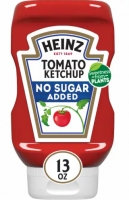 I've learned to avoid food items labelled "no sugar added," because that usually does not mean the product is less sweet, but is artificially sweetened. When I picked up this bottle of ketchup, I expected to find sucralose, which I detest, in the ingredient list. I was surprised and pleased to see that the sweetener in this case was not sucralose, but rather stevia.
I've learned to avoid food items labelled "no sugar added," because that usually does not mean the product is less sweet, but is artificially sweetened. When I picked up this bottle of ketchup, I expected to find sucralose, which I detest, in the ingredient list. I was surprised and pleased to see that the sweetener in this case was not sucralose, but rather stevia.
Ingredients: tomato concentrate from red ripe tomatoes, distilled white vinegar, salt, natural flavoring, stevia leaf extract, onion powder.
I had to laugh at the claim "Sweetness from PLANTS" on the label. Just what do they think sugar cane is, an animal?
But I got over it, and decided to try a bottle.
Much to my surprise, I loved it at first taste, and have so far had no cause to change my mind. It doesn't taste artificial, and has a brighter, fresher taste than regular ketchup. Time will tell, but I may be a convert.
I'm definitely still climbing out of battle-fatigue mode when it comes to writing. It's so weird. Normally I find writing to be energizing and restorative. I find it relaxing, even when it's also a struggle. Writing is one of the most important ways I keep my hold on sanity; writing is how I think. But ever since the election, my incessent and irresistable drive to write has gone into hibernation. Generally, I'm pleased with the results of the election, but I'm not dancing in the streets; I'm numb and exhausted. The last few months have been intense.
It may be weird, but at the moment it's a good thing. Too many other areas of life are demanding my attention! I know I'll be back to writing soon enough. But for the moment, I'm pulling out bits and pieces I've saved for just such a time.
This may not be the most important thing my father taught me, but it comes close to a universal truth.
Why is it that if you are trying to lose weight, one tablespoon full of ice cream will add five pounds, but if you are trying to gain weight, a whole day's worth of forbidden food makes not one iota of difference?
I love the Amish people. It was an Amish Supreme Court decision (Wisconsin v. Yoder) that became the backbone of home education today. Our family has deep personal ties to a court case that brought the Amish of Western Pennsylvania into downtown Pittsburgh to show their support in a situation that threatened their own way of life. The Amish are a very private people who just want to be left alone to live their traditional lives, but they will rise up and make themselves heard when their very existence is at stake. Several of our grandchildren were born in Amish Country. I'm not Amish, and I don't even know personally any Amish people, but I admire them greatly.
The following video is from Nick Johnson, about whom I know nothing else; it showed up as one of those YouTube suggestions after I watched something else. I found it delightful on many levels, from the scenery, to the simple, innocent, and very shrewd wisdom of the Amish people, to their solid values, to their delightful accents. (Did you know that their language is still understandable by modern-day speakers of Swiss German?) There's also an interview with Amos Miller, who is at the forefront of the fight for food freedom in Pennsylvania; we have some of his great meat in our freezer even now.
If you've ever met an Amish buggy on the road, you'll know how surprising this image is.
Traditionally, the Amish do not participate in civic matters. They do not vote. But this year, they see an opportunity to speak up for their way of life, the very existence of their farming and small business based culture, which is being crushed by heavy-handed governmental regulations that favor large corporations. They are voting this year, and in large numbers. For a look into a beautiful part of American culture that we rarely see, enjoy this 30-minute video.
Amos Miller is excited about the team that is gathering around Donald Trump.
They know the importance of farmers, they know the importance of food freedom, and I'm hoping that Trump will get that same perspective so we the farmers can do our duty that we've liked to do for many years. Farmers are going out of business like flies. We have lost probably 50% of our farmers within the last 20 years. We like to be farmers, we love to be farmers, but the rules and regulations that have been forced upon us for the last 30 years are terrible. We can't make a living, the food system is monopolized, the corporations want to run the government—so we're looking for someone to push government back, so we can be the true farmers that we love to be. Our culture loves to be farmers. The work ethic is still here; that can be lost in a very short period of time if we can't be farmers.
Permalink | Read 755 times | Comments (0)
Category Health: [first] [previous] [next] [newest] Politics: [first] [previous] [next] [newest] Children & Family Issues: [first] [previous] [next] [newest] Food: [first] [previous] [next] [newest] Conservationist Living: [first] [previous] [next] [newest] Here I Stand: [first] [previous] [next] [newest]
One of my favorite Substack people (Heather Heying, Natural Selections) wrote this in her article entitled, "It’s an Upside Down World, and You’re Living In It."
I used to be a Democrat. Two of the things that I did that felt democraty include:
I bought as much of my food as possible at farmer’s markets, and got to know the farmers who grew my food. I bought organic, and avoided GMOs. When given a choice, I bought food that was grown closer to how it had been before humans got involved—cows that had spent their lives grazing outside, coffee grown in the shade on farms with canopy trees, tomatoes and strawberries picked at perfect ripeness, transported as little as possible, eaten fresh and raw.
And I refused pharmaceuticals except when absolutely necessary—the notable exception being vaccines, which I barely questioned until Covid raised my awareness. Over the counter drugs were no better. The rule of thumb in our house was: the longer it’s been on the market, the more likely it is to be safe. Aspirin seemed like a pretty safe bet, as did some antibiotics, in moderation. Everything else? Buyer beware.
I still do these things. My behavior was always informed by an evolutionary understanding of the world, a fundamental preference for solutions that have stood the test of time (e.g. beef over lab-grown meat), and wanting as little corporate product and involvement in my life as possible. Such behavior just doesn’t seem democraty anymore. It seems like the opposite.
In response, I wrote the following.
For decades, I have been saying that the Republicans need to reinvent themselves as the party of human-scale life. Seeing Trump and Kennedy together call to Make America Healthy Again gives me more hope in that direction than I've had in a long time.
Your beautiful, healthy approach to living felt Democrat-y to you, but in my life it has always been embraced by a mixture of folks, from hippies to conservative Christians, who shared a love of what we saw rejected by mainstream society: children and family life; non-medicalized childbirth and homebirth; the critical importance of breastfeeding; independent and home education; the belief that children can be far more competent and responsible than we give them credit for; small businesses; small farms and natural foods; the superior flavor and health benefits of raw milk and juice, pasture-raised animals, and organically-grown fruits and vegetables; homesteading and preserving/restoring the land; reclaiming heritage breeds and seeds; and a deep concern for the environment that was called conservation before it was taken over and ruined by the environmentalist movement.
If the Republican Party will truly embrace and fight for these values, I will in turn be thrilled to have finally become a Republican after 56 years a Democrat. The beginning of the end of my complacency with the Democratic Party was discovering the party's intense opposition to homeschooling—despite the fact that so many of the home education pioneers were radical liberals in their day.
Home education may have been the beginning of my disaffection, but the disconnect between the Democratic Party and the values I thought were their priorities became more and more obvious, accelerating at a most alarming rate, to the point where I agree with Dr. Heying again:
The democrats are claiming that they’re on the side of the little people. The only proper response to such claims is this: No. No you are not. Stop lying. And: No.
Republicans, this is your chance. Don't blow it by infighting, nor by sabotage from within. Reach out to the Independents and disaffected Democrats—like Dr. Heying, and RFK Jr., and Sasha Stone...and me—who are reaching out to you, willing—eager—to put aside our differences long enough to do the really hard work of seeking and saving that which is rapidly being lost.
Permalink | Read 676 times | Comments (0)
Category Education: [first] [previous] [next] [newest] Health: [first] [previous] [next] [newest] Politics: [first] [previous] [next] [newest] Children & Family Issues: [first] [previous] [next] [newest] Food: [first] [previous] [next] [newest] Conservationist Living: [first] [previous] [next] [newest] Here I Stand: [first] [previous] [next] [newest]
I made nasi goreng (Indonesian fried rice) for dinner tonight. (It was yummy.) The oil I used was coconut oil, and the experience was not without mess and a few muttered grumbles: Why does coconut oil come in jars instead of bottles?
Before transferring the oil to one of the bottles I use when I make oil infusions, I took a picture of my coconut oil, because it finally occurred to me that coconut oil comes in jars because this is not what it looks like for most of you:
I guess I'll worry about getting the oil out of my tall, thin bottle when winter comes.
I think we all need some good news this morning, completely free of political angst.
Dark Chocolate May Be Good for the Eyes, Study Says
As with most Epoch Times articles, this may require an e-mail address to see, even though it's free. So I'll quote a few relevant sections.
Researchers from Italy found that eating just a few squares of dark chocolate—around three from a standard bar—could improve how well the blood vessels in your eyes work. These vessels are essential for maintaining clear and healthy vision.
It found that consuming dark chocolate significantly widened the blood vessels in the retina when exposed to flickering light. This widening improves blood flow, allowing the retina to receive more oxygen and nutrients, which helps it function properly.
[Lead author Giuseppe] Querques, who is also a professor of Ophthalmology at the Università Vita-Salute San Raffaele in Milan, said that this suggests that dark chocolate might help prevent eye diseases and could have broader health benefits, as the effects seen in the eye’s blood vessels might reflect how cocoa affects the rest of the body.
According to Queques, dark chocolate helps increase the production of nitric oxide, which makes blood vessels in the eyes widen more. The plant compounds in dark chocolate boost the amount of nitric oxide in the body, leading to greater dilation of retinal vessels.
Note that nitric oxide has many other heath benefits, and you can get it from sunshine as well as from chocolate. Also, beets. Two out of three....
Querques added that if further studies confirm that regular dark chocolate consumption plays a favorable role in preventing or managing retinal diseases, “daily cocoa intake could be used as a therapy or prevention not only of retinal but also of systemic diseases.”
I note with special pleasure that this is the first article I have read that speaks of the benefits of eating dark chocolate without feeling obligated to add, "But we all know chocolate also contains bad things like fat and sugar, so we don't recommend eating it."

